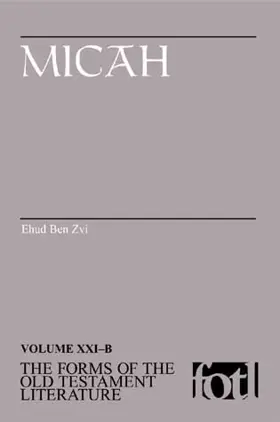

Micah
in Forms of the Old Testament Literature
Pages
208 pages
Publisher
Eerdmans
Published
2/1/2000
ISBN-13
9780802845993
The Forms of the Old Testament Literature Series has long been acknowledged as a unique and valuable commentary on the Old Testament. The volumes in the FOTL series are specifically concerned to explore the structure, genre, setting, and intention of each type of biblical literature so the fullest possible meaning of Scripture can be uncovered.
This new addition to the FOTL commentary series presents a complete form-critical analysis of the book of Micah. Ehud Ben Zvi looks at how Micah was read by its ancient audience and explores the social setting that stands behind it. Emphasis is placed on the construction of the past, on the images of the future, and on the relevance of both of these to the present of the community or communities of readers for whom the book was intended. His various lines of investigation lead to a deeper understanding of Micah and its enduring message.
Collections
This book appears in the following featured collections.
- Commentaries by Jewish Scholars by Matt Quintana
- TGC: Scholarly Commentaries by The Gospel Coalition
Reviews
Ben Zvi’s work on the literary forms of Micah is very helpful given the challenging nature of Micah’s poetic structures. Longman writes, “ben Zvi has produced the most comprehensive analysis of the form-critical nature of the prophet. He has some very interesting comments on the fact that Micah is a book that is constantly reread. Even those who will not accept the conclusions of his analysis— and many evangelicals will not— will still find this commentary a useful compendium of other people’s opinions.”
[Full Review]
Grand Rapids: Eerdmans, 2000. Pp. xvi + 189, Paperback, No Price Available, ISBN 0802845991. Jan A. Wagenaar Utrecht University Utrecht, Netherlands Volume XXIB in the series The Forms of the Old Testament Literature presents a form-critical study of the Book of Micah. In accordance with the aim of the series the volume examines the structure, genre, setting and intention of both the individual units and the book as a whole. Ben Zvi argues that the Book of Micah presents itself as an authoritative writing that was composed to be read and reread time and again. The primary readership of the book was a group of literati who were competent to read and thus became the intermediaries or brokers of divine knowledge for their illiterate or less competent contemporaries. The importance of the social identity, the world of knowledge, the theology and ideology of the primary readership for the message of the book calls for the identification of this readership. The historical setting of the authorship and readership of these texts is characterized by the social and historical circumstances that allow for the training and maintenance of the cadres of literati and the production, reading and rereading of their works. The emphasis on the catastrophe that befell Jerusalem, the exile and salvation, the Jerusalem-centered theology that permeates the book as well as the social and economic resources necessary for the production of such literary works all point to the temple community in the late Persian period. The world in which the book was composed, read and reread thus differs from the world evoked by the text: the monarchic period. The readership was invited to read the book against the background of the circumstances of the monarchic period, but at the same time they were asked not to historicize the text in such a way that their reading was influenced by any particular event in their recollection of the past.
[Full Review]

